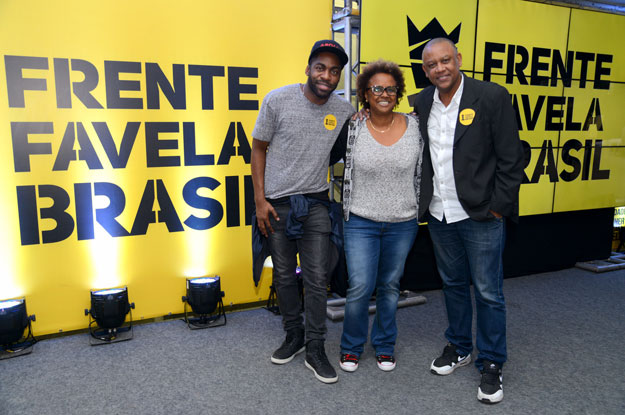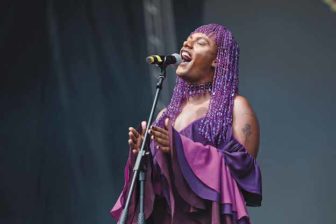Celso Athayde watched closely as members of Congress lined up on April 2016 to vote on President Dilma Rousseff’s impeachment. Conscious of the national audience following the proceedings, legislators dedicated their votes to their constituencies or causes: families, home states, insurance brokers – even Christians.
Two things struck Athayde: the representatives were mostly white. And no one – not even the handful of black or brown representatives – said they were voting on behalf of black people.
“I saw blacks voting on behalf of the evangelical, agribusiness and weapons sectors,” said Athayde, a social entrepreneur and founder of the Central Única das Favelas. “Black people were not represented by anyone.”
The day after the televised vote, Athayde wrote an email to some of his most influential black friends and associates with one simple message: “The time is now.” Brazil needed a political party to represent the interests of blacks, Athayde said.
“You don’t exist when you don’t organize,” he said.
Although more than half of Brazilians identify as black or multiracial, political power and wealth has always been in the hands of whites, with widespread social and economic consequences. The average monthly income of blacks ($294) is 40 percent lower than whites ($513). In 2013, blacks had on average 7.2 years of schooling compared to 8.8 years for whites. Whites occupy almost all the top positions within political parties, state bureaucracies and private businesses; blacks are largely absent from leadership roles in these institutions.
Not only are there few black or brown politicians, but even among those that publicly declare a black identity – such as Marina Silva, a candidate in the 2014 presidential elections – many do not necessarily embrace race or black issues as part of their platform. She seldom spoke of race during her campaign.
This is the reality Athayde wants to change. One year after Brazilian legislators voted to impeach their president, prompting him to send out that initial email to friends, the country is just one step away from gaining a political party that has black Brazilians’ interests at its core – Frente Favela Brasil.
This proto-party now has 32,000 participants in special-interest groups, social media platforms and administration. Once it receives its political identification number this month and overcomes the next hurdle, collecting at least 500,000 signatures across nine or more states, it could field candidates for the country’s 2018 election.
This isn’t the first time Brazilians have tried to mobilize politically around race. The São Paulo-born Frente Negra Brasileira (Black Brazilian Front) fought for equal rights for blacks in the 1930s and gained a national following. It was shut down in 1937, however, when President Getúlio Vargas banned all political parties. Frente Negra Brasileira never had an opportunity to run black candidates that dealt with black issues.
FFB also isn’t Athayde’s first attempt at a political party for black people. Sixteen years ago, he tried to start a blacks-only party based on hip-hop culture – the Partido Popular Poder Para a Maioria (Popular Party Power to the Majority). But the idea didn’t get far.
“The timing was not right,” Athayde said. “We needed an ideology bigger than hip hop and we couldn’t limit it to just blacks.”
Since then, much has changed. Brazil’s universities adopted affirmative action for poor and black students. Now Brazil has a significant number of college-educated blacks who are organizing around race-based issues like police violence, black feminism and Afro-Brazilian heritage. Internet and social media have allowed blacks to produce and distribute their own media and ideas.
In 2010, for the first time, more than half (50.7 percent) of Brazilians identified as black or multiracial – and that number is increasing. Sociologists have attributed the growth in self-identification to more positive attitudes about race. But these advancements might not be enough to support a new party for black Brazilians, experts said.
“For the first time ever, the theme of race is a major part of the national discourse,” said Carlos Medeiros, a black activist and scholar. “But the discussion doesn’t go very deep and it won’t help the political party much.”
Many blacks in favelas and the periphery don’t identify themselves as such, Medeiros said; also, blacks don’t vote as a block. Salvador, a city that is more than 80 percent black and multiracial, has not elected a black mayor since the dictatorship stopped appointing mayors in 1985.
Despite his awareness of these challenges, Athayde launched the Frente Favela Brasil with a party on July 28, 2016, a symbolic event in Rio de Janeiro’s Providência favela, a hillside community that became home to many blacks after abolition.
The newborn party is still defining its boundaries and constituencies, but it is officially a party for blacks, favela dwellers and other marginalized citizens—even if they are white. Fifty percent of the party’s positions will be reserved for members under 36 years old, and 50 percent will be reserved for women. There will always be a man and woman as co-presidents of the party. To its first members, this is an inspiring start.
“All of the existing political parties are white at the highest levels,” said Patricia Alencar, 36, a favela community organizer who leads FFB with Wanderson Nascimento, 28, a gay doctoral student. “In Brazil there is an expression that says ‘those who are not comfortable should move out.’ This is what we are doing – moving out and into a house that we are building.”
Fundamental questions remain. These days, Brazil is a polarized country. Is FFB a party of the right or of the left? The party’s leaders argue they are trying to look beyond the typical political divisions and focus on issues crucial to black people and the poor.
“We are not going to position ourselves as right or left because neither represent the black or poor population,” said Luiz de Jesus, an evangelical Christian pastor who is vice-president of the party. “Blacks are being killed by police in Brazil and no politician of any stripe is doing anything to stop it.”
The party has yet to take stands on the traditional issues that dominate Brazilian politics: Abortion, land rights, religious intolerance, public safety, and of course, the issue of the moment – the overhauling of workers’ rights and social security. This bothers Cosme Felippsen, 27, a community leader from Rio de Janeiro’s Providência favela.
“This is something that I still don’t understand,” Felippsen said. “But I’m even more concerned that the party might be co-opted by money and the system and then forget about its roots.”
A party so new and outside the traditional mold likely stands little chance of running strong candidates in the 2018 presidential elections, said Ollie Johnson, a political scientist and chair of the African-American studies department of Wayne State University.
“But I could be wrong,” he said. “Brazilians are disgusted with the current parties. This might provide an opening for fresh faces with a new discourse.”
—
Freelon is a freelance journalist based in Rio de Janeiro.







